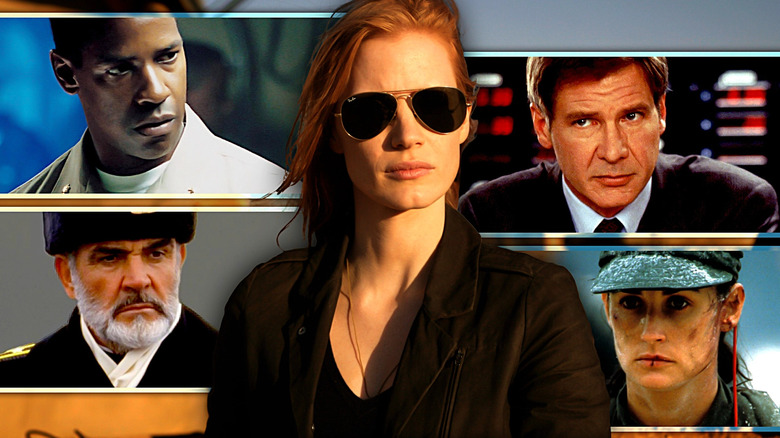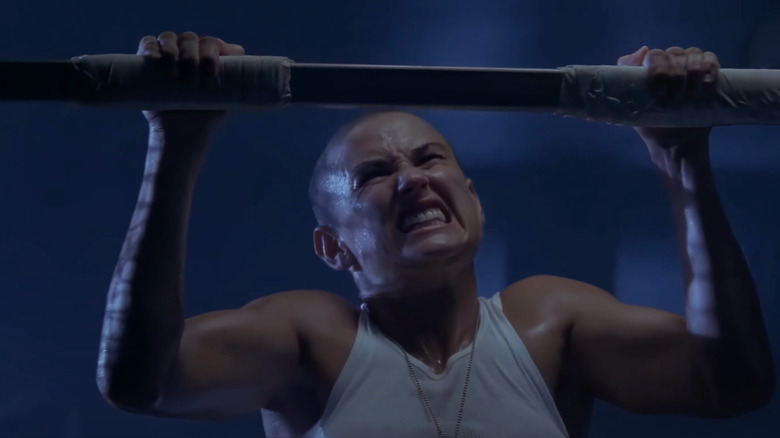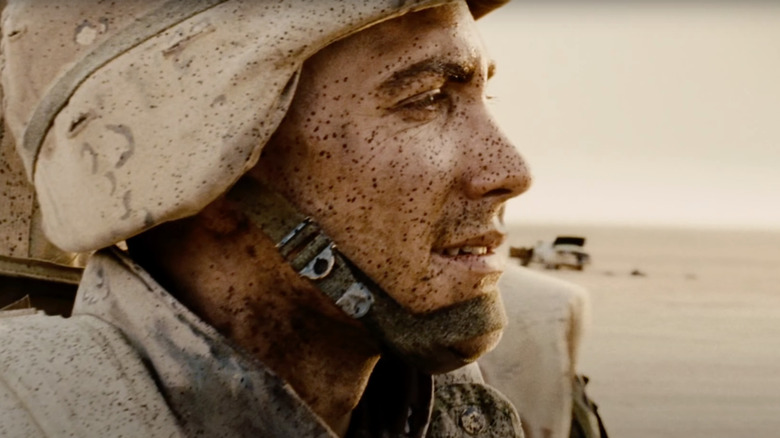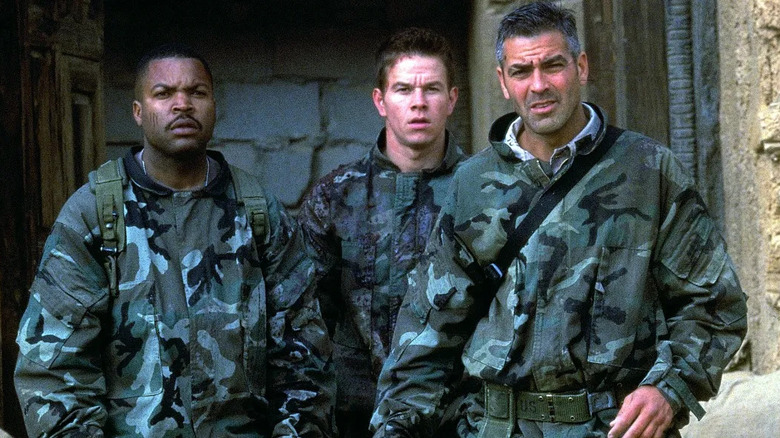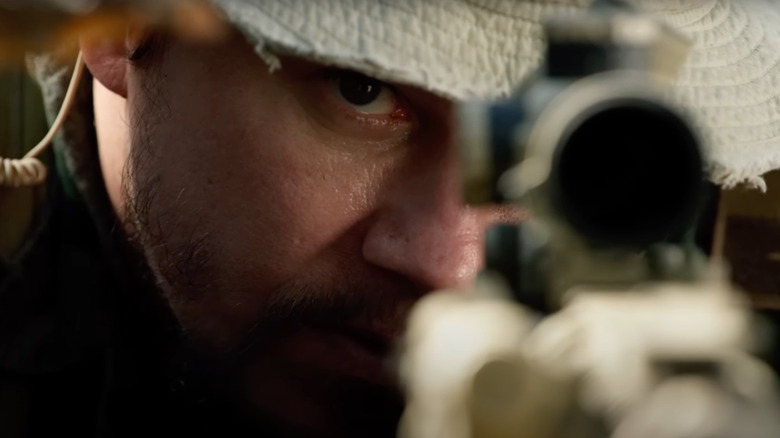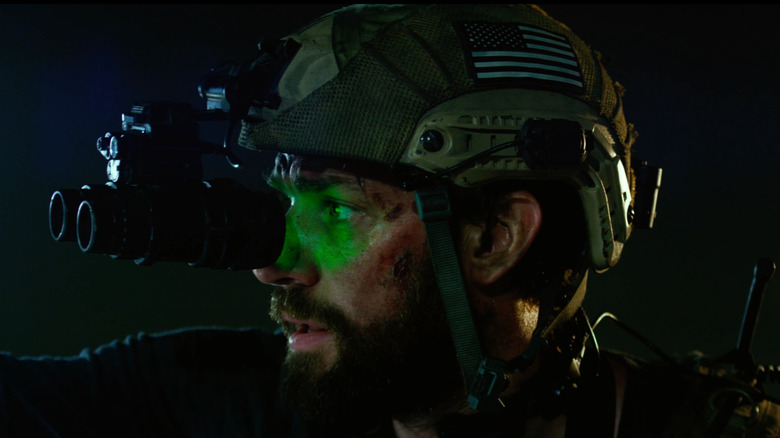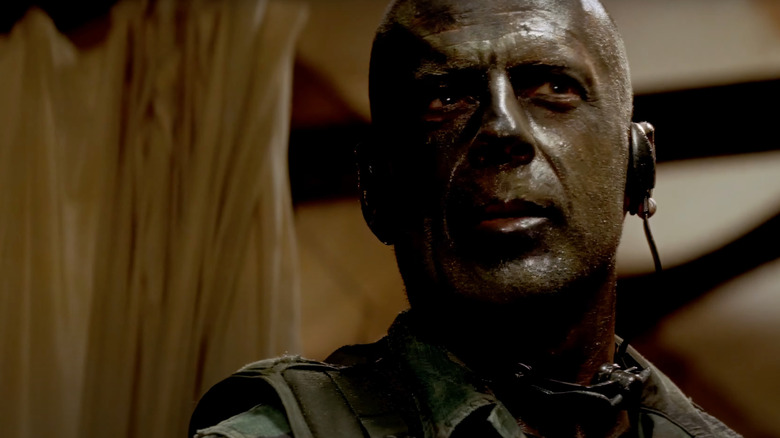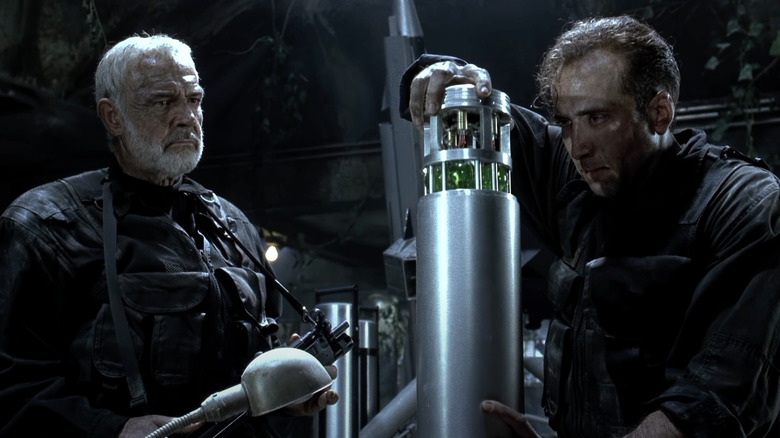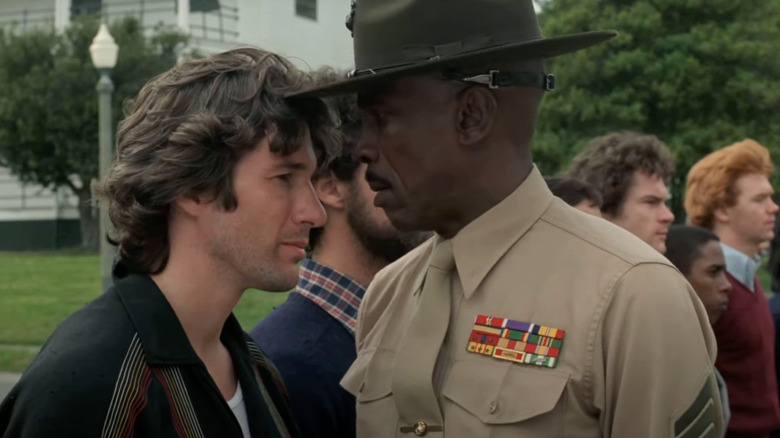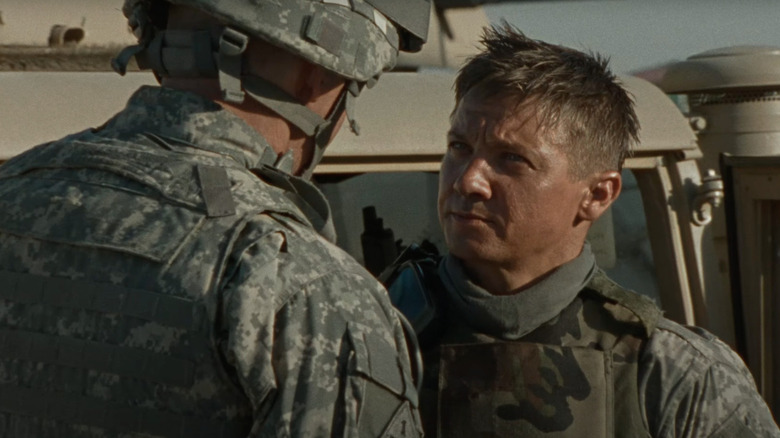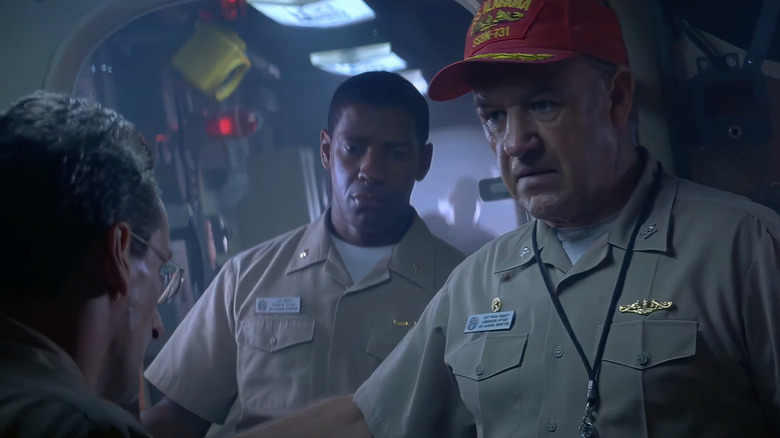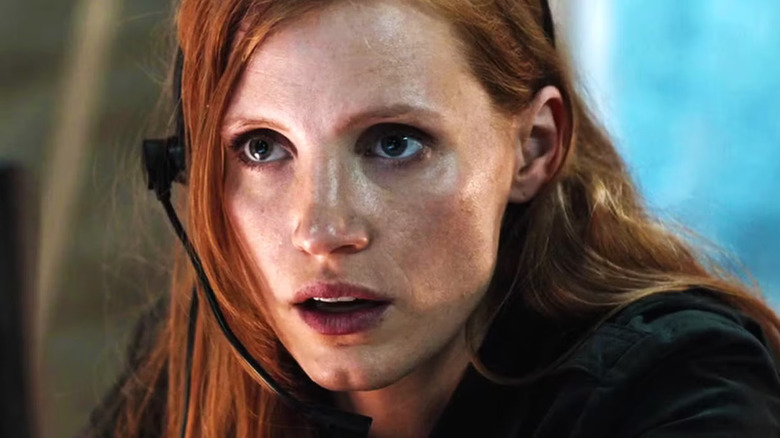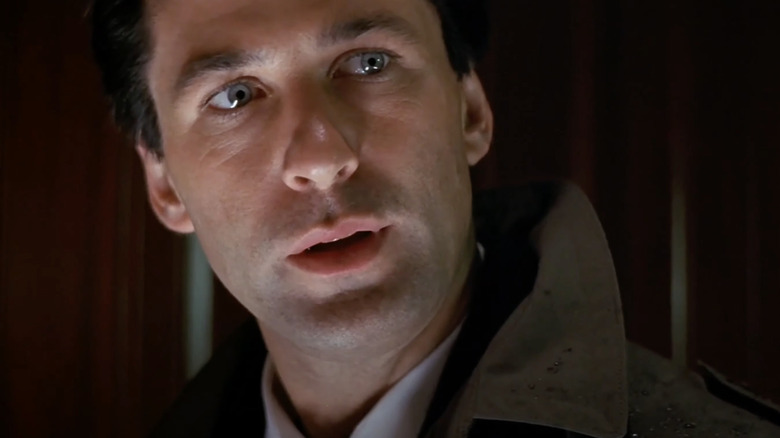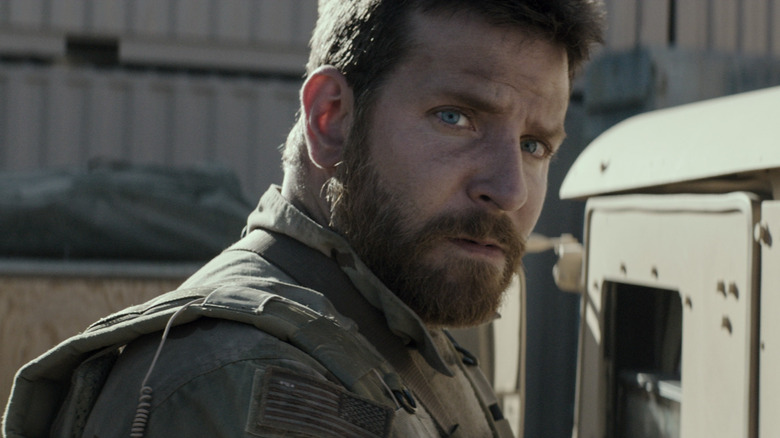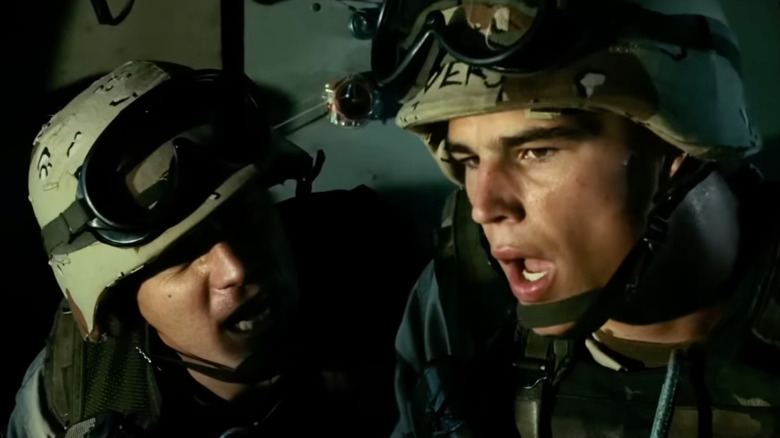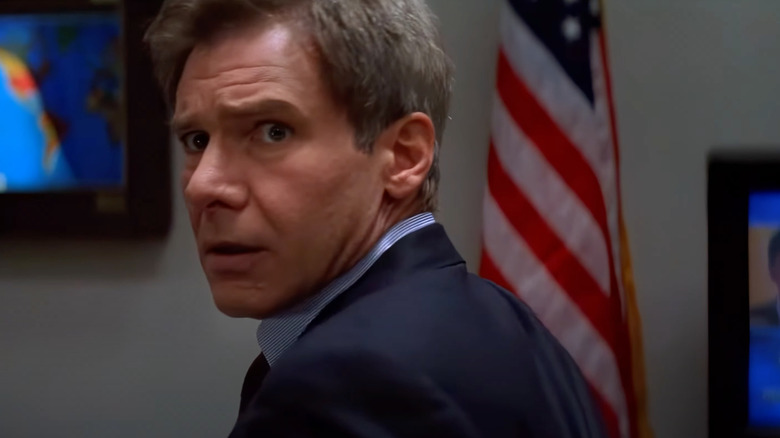15 Best Military Movies Of All Time, Ranked
After discussing the 30 greatest war films of all time, we decided to keep the patriotic momentum going with another article based on a similar theme: The 15 best military movies. What's the difference? A war film such as "Saving Private Ryan" focuses on larger-scale historical or fictional conflicts, while a military picture centers on individual soldiers, operations, and specific missions, mostly set in the modern era. Often, these stories take a critical look at contemporary warfare and the dubious nature of many top-secret operations, political or otherwise.
Several pictures on this list are more personal in their approach to the controversial subject matter, allowing us to see the military's effects on the people pulling the trigger. Others blend sharp geopolitical commentary with edge-of-your-seat thrills. All are worth your attention and offer a captivating window into the lives of the men and women who serve. Get ready for a hefty dose of grit, guts, and heroism!
G.I. Jane (1997)
Ridley Scott's "G.I. Jane" stretches a bold premise for all its worth, offering a gritty look at the United States military through the eyes of Jordan O'Neill (Demi Moore). After receiving criticism from a Texas senator for not allowing women to enter its program, the Navy strikes a deal that enables O'Neill to show her stuff. Her mission: She must endure the U.S. Navy Combined Reconnaissance Team (CRT) — a Hollywood-ized version of Navy SEAL training — including an iteration of the dreaded "Hell Week" designed to push soldiers to their absolute limit.
Naturally, her fellow trainees aren't thrilled about a woman joining their ranks and attempt to sabotage her at every turn. Making matters worse is the abuse she suffers at the hands of the cold-blooded Command Master Chief John James "Jack" Urgayle (Viggo Mortensen), whose hostility escalates with each of O'Neill's victories.
Featuring one of Demi Moore's best performances and coated with Scott's typical artistry, "G.I. Jane" smacks viewers over the head with its themes, even as it presents a stirring story about resiliency and determination, teamwork, and personal growth. It's worth a watch just to see Moore's one-handed pushup bit.
Jarhead (2005)
What happens when soldiers train for days on end and never see combat? That's the question posed by director Sam Mendes' 2005's "Jarhead." Rather than deliver another brutal Iraq War film, Mendes and writer William Broyles Jr. focus their attention behind the scenes, where U.S. soldiers spend countless hours training for battle, only to grow restless with their regimented life. The soldiers find ways to entertain themselves. They talk about girlfriends, throw late-night parties, play football in gas masks, watch war movies, and dare others to put them out of their misery. When they're finally deployed, it's more of the same. They march, train, and grow despondent, watching the conflict unfold from a distance.
"Jarhead" critically examines an entirely different aspect of the military that we too often ignore. Imagine spending years of your life enduring the rigors of boot camp — as Corporal Anthony Swofford (Jake Gyllenhaal) does — without the promised payoff. Should they be happy at not having to kill another human being? Or frustrated at being denied a sense of purpose? It's a tricky psychological dilemma, making "Jarhead" one of the more unique pictures on this list.
Three Kings (1999)
"Three Kings" offers a wildly unconventional view of war, mixing dark comedy with sharp social commentary, wrapped in a thrilling heist flick. Starring George Clooney, Mark Wahlberg, Ice Cube, and Spike Jonze, this entertaining 1999 dramedy takes place at the tail end of the Iraq War and chronicles three soldiers attempting to steal a cache of gold from Saddam Hussein. Along the way, they're confronted with the devastating effects of the conflict on innocent civilians, forcing them to choose between helping the afflicted or pursuing their own self-interest.
While "Three Kings" often plays like a war movie — specifically in its deconstruction of heroism — it focuses more on the protagonists' mission than outright combat between U.S. and Iraqi forces. Writer/director David O. Russell takes a critical look at the military machine, highlighting how high-level agendas overshadow the people caught in the middle of combat. The result is a gritty morality tale set against a much larger geopolitical backdrop.
Lone Survivor (2013)
In "Lone Survivor," starring Mark Wahlberg, a group of soldiers faces a tough decision: Stand and fight with their limited resources or hurl themselves over the side of a cliff onto the rocks below. In the latter scenario, they might sustain several broken bones, cuts, and bruises, but it at least affords the best chance of survival — at least for now.
Make no mistake: Peter Berg's 2013 recreation of Operation Red Wings, a failed attempt to eliminate a critical Taliban target during the Afghanistan War, is undeniably tough to watch. The film revels in gory details and features numerous depictions of U.S. soldiers — their bodies riddled with bullets — valiantly fighting to the bitter end. But beyond its brutality, "Lone Survivor" offers a compelling glimpse into combat tactics and military procedures. Berg has a knack for staging intense action, often at the expense of story and character, and delivers a product best described as "Black Hawk Down"-lite.
Check it out, and then watch this behind-the-scenes video for a deeper dive into "Lone Survivor."
13 Hours: The Secret Soldiers of Benghazi (2016)
Michael Bay's tendency to exaggerate events is the only thing bogging down "13 Hours: The Secret Soldiers of Benghazi." Otherwise, this 2016 depiction of the 2012 Benghazi attack on a U.S. diplomatic compound and a nearby CIA annex presents a visceral look at soldiers under duress and the unique, carefully orchestrated tactics they utilize to stay alive. At one point, in the dead of night, a group of soldiers positioned on a roof uses infrared lasers to mark unsuspecting incoming targets, most of whom are slaughtered during the subsequent assault. Like "Lone Survivor," we see the difference between an organized squad and a massive militia, and it's very one-sided.
More dramatically, Bay demonstrates how communication failures amid combat lead to terrible consequences. Our boys, led by a beefed-up John Krasinski as Jack Silva, are left for dead when the higher-ups decide to wash their hands of the situation. "13 Hours" plays loose with some of its facts but goes hard as a potent portrayal of a disastrous military operation.
Tears of the Sun (2003)
"Tears of the Sun" had all the makings of a box office hit—a good director (Antoine Fuqua), a solid cast led by the estimable Bruce Willis, a decent premise, and a stirring Hans Zimmer score. And yet, the 2003 action-drama fell flat at the box office and failed to resonate with critics. The fault lies mainly in the script by Alex Lasker and Patrick Cirillo, which plays it too safe to offer any meaningful commentary. Still, Fuqua's slick direction and Willis' stoic presence keep the film afloat.
The plot follows a group of U.S. Navy SEALs sent to war-torn Nigeria to extract a doctor (Monica Bellucci). Once on the ground, the soldiers arrive at a moral crossroads: follow orders or lead a group of refugees to safety.
Fuqua, who endured plenty of behind-the-scenes grief from Willis, goes hard with the military elements, devoting ample screen time to showcasing the squad's precision, communication, and brotherhood under extreme duress. "Tears of the Sun" doesn't break new ground, narratively speaking, but delivers a fair share of visceral thrills and strikes the occasional emotional target along the way.
The Rock (1996)
"Bad Boys" put Michael Bay on the map in the mid-90s, but "The Rock" cemented his place as a rising star in the industry. Starring Sean Connery, Nicolas Cage, and Ed Harris, "The Rock" sees a vengeful general (Harris) take over Alcatraz and threaten to obliterate San Francisco with rockets filled with VX gas. It's up to Dr. Stanley Goodspeed (Cage) and an imprisoned, ex-MI6 operative (Connery) — who may also be James Bond, according to an incredible fan theory — to save the day. Cue the nonstop thrills.
"The Rock" follows the established "Die Hard" formula to a T, but Bay's kinetic style carries the routine script across the finish line with flying colors. His knack for fetishizing all things U.S. military is on full display – notably in the tense SEAL insertion sequence, which feels like a dry run for his later work. While the action is hyper-stylized, the military jargon, team discipline, and tactical procedures used by the SEALs reflect basic special ops authenticity. In many ways, "The Rock" feels like a "Call of Duty" campaign brought to life. It gets a tad hammy sometimes, but Bay's signature style keeps the action moving at a crisp, relentless pace.
An Officer and a Gentleman (1982)
In "An Officer and a Gentleman," Zack Mayo (Richard Gere), a brash and arrogant man, decides to attend an Aviation Officer Candidate School (AOCS), where he learns important lessons about life and love. That's the basic setup for Taylor Hackford's beloved 1982 romantic drama, which packs quite the emotional punch despite adhering to the path of almost every rags-to-riches military drama. It helps to have a trio of terrific stars at their absolute peak. Gere shines as Mayo, believably transforming from a selfish, stubborn, misguided young recruit to a mature officer, while Debra Winger strikes the perfect balance between desperation and hopeful romantic. Still, the picture belongs to the late Louis Gossett Jr., who won a well-deserved Oscar for his intense performance as the gunnery sergeant tasked with whipping our protagonists into shape.
Beyond the romance and training montages, "An Officer and a Gentleman" presents an intricate look at the various tactics used by the military to mold an individual into a powerful force. Hackford leans into certain clichés —the infamous wall-climbing scene comes to mind—but the film endures as a stirring character study about finding self-worth in the most unlikely of places.
The Hurt Locker (2008)
Kathryn Bigelow's 2008 Best Picture winner, "The Hurt Locker," is a dark look at combat's effects on individual soldiers. In this case, Sergeant First Class William James (Jeremy Renner), Sergeant J.T. Sanborn (Anthony Mackie), and Specialist Owen Eldridge (Brian Geraghty) make up a U.S. Army Explosive Ordinance Disposal team tasked with weeding out bombs during the Iraq War. The problem is that James is a wild card and prone to taking risks without regard for the safety of his men. This sets the stage for a gripping clash of ideologies: One man thrives on chaos, and two others just trying to make it home alive.
At its core, "The Hurt Locker" explores how military combat rewires the human brain — turning soldiers into adrenaline junkies who struggle to function outside the war zone. For all his skill, James becomes a tragic figure, a man who feels more at ease disarming bombs than shopping for cereal at the local supermarket. It's a devastating examination of the true costs of war.
Crimson Tide (1995)
"Crimson Tide" hits audiences with a scary premise: what if the chain of command fails aboard a nuclear submarine on the eve of war? Here, Captain Frank Ramsey (Gene Hackman), commanding officer of the USS Alabama, comes to blows with his newly established executive officer, Lieutenant Commander Ron Hunter (Denzel Washington), after an incomplete transmission leaves the ship's orders unclear. Ramsey, a book-abiding traditionalist, believes they should follow the last confirmed directive to launch nuclear missiles. Hunter, a younger, more forward-thinking college graduate, urges caution, thinking they should wait for verification. The ensuing power struggle divides the crew and sparks a tense mutiny.
This smart, high-stakes thriller, directed by Tony Scott, explores the fragility of military leadership and the terrifying responsibility of nuclear command. Something is unnerving about Ramsey's unwavering commitment to protocol. In that same breath, we need men like him to maintain order. "Crimson Tide" operates in this moral gray zone, diving deep into a character-driven conflict while tackling big questions about duty and authority. It's one of the most gripping military dramas of the 1990s.
Zero Dark Thirty (2012)
Another entry by Kathryn Bigelow, "Zero Dark Thirty," chronicles the decade-long hunt for Osama Bin Laden following the September 11 attacks. This gripping 2012 thriller spends much of its runtime on CIA intelligence work — led by Jessica Chastain's analyst Maya — before shifting its gears to full-on military precision in its final act. Here, we meet the members of SEAL Team Six responsible for executing the attack on Bin Laden's compound, namely Patrick Grayston (Joel Edgerton), Justin Lenihan (Chris Pratt), and Saber Till (Callan Mulvey), among others.
As she accomplished in "The Hurt Locker," Bigelow ratchets up the tension without drifting too far from the facts, though with "Zero Dark Thirty," she stirred up a bit of controversy. The raid is a masterclass in realistic military filmmaking, highlighting SEAL tactics used during the high-stakes operation. The preceding two acts, by contrast, unfold like a slow-burn political thriller, complete with controversial interrogation methods used by the CIA to gather intel — a choice that raises complex questions about morality and the true cost of justice. Two movies for the price of one. What's not to like?
The Hunt for Red October (1990)
The first big-screen adaptation of Tom Clancy's classic Jack Ryan series sees our beleaguered CIA Analyst (Alec Baldwin) attempt to prevent a global conflict. A Russian commander named Marko Ramius (Sean Connery) has gone rogue, taking the helm of a Typhoon-class ballistic sub equipped with a stealth propulsion system capable of evading sonar. His course: Straight to the United States. Ryan believes Ramius, grief-stricken after the passing of his wife, wants to defect — but he must convince wary U.S. military brass before it's too late.
Taut, well-acted, and packed with Cold War tension, this John McTiernan-directed technothriller brings military intelligence and submarine warfare to the forefront. Clancy was known for his painstaking attention to detail, and while some of the book's complexity is streamlined for the screen, mostly due to studio interference, "The Hunt for Red October" achieves its mission as a cerebral, strategic nail-biter. Think of it as a large game of chess, albeit with submarines, helicopters, CIA operatives, and high-ranking government officials. This is military cinema through a cerebral, strategic lens.
American Sniper (2014)
Clint Eastwood sets his sights on the Iraq War with "American Sniper," the powerful true story of Chris Kyle, the most lethal marksman in U.S. military history. The film charts Kyle's journey from a Texas rodeo cowboy to a battle-hardened Navy SEAL, where he racks up 160 confirmed kills over four tours in Iraq.
Yet, the heart of the film lies Kyle's inner conflict as he struggles to balance his duty on the battlefield with his responsibilities at home. Played by Bradley Cooper, in a tremendous performance, Kyle feels obligated to protect his fellow soldiers, returning to combat again and again, despite the growing toll it takes on his wife (Sienna Miller) and family. Eventually, he returns home, only to be tragically killed by a fellow veteran suffering from PTSD.
Like all great military dramas, "American Sniper" shows the perils of combat and the psychological impact of taking a life. Eastwood, who took over the directing gig from Steven Spielberg, crafts a haunting portrait of a man whose heroism came with a steep personal price.
Black Hawk Down (2001)
Ridley Scott's "Black Hawk Down" stands proudly as an exemplary piece of action filmmaking and easily a top-tier effort from the maestro. A brutal recreation of the Battle of Mogadishu that took place in 1993 in Somalia, this 2001 effort largely sidesteps politics, instead choosing to focus on the intense hour-by-hour firefight between Task Force Ranger and thousands of hostile Somali militiamen. The chaos ultimately led to the deaths of 18 American soldiers and hundreds of Somali fighters and civilians.
What begins as a routine military operation — the capture of key lieutenants of Somali warlord Mohamed Farrah Aidid — quickly escalates into a deadly urban battle that tests the resolve and capability of U.S. Army Rangers and Delta Force operators. Regardless, those involved live by a sacred mantra: Leave no man behind. Numerous soldiers put their lives on the line to rescue their fallen or wounded comrades, even as the odds grow increasingly dire.
While characterizations are admittedly thin, the heart of Scott's story lies in the unbreakable bond between soldiers and their relentless determination to fulfill their duty. "Black Hawk Down" is decidedly anti-war, yet it also celebrates the camaraderie and courage forged in the heat of battle. Here is a powerful true story of heroism and courage, a sobering critique of modern warfare, and a salute to the brave men and women who fight on the front lines.
Listen to Scott's commentary on the film — one of his top five best!
Clear and Present Danger
Yes, another Tom Clancy film. However, rather than honing in on submarines, "Clear and Present Danger" follows a much older – Clancy would say too old – Jack Ryan (Harrison Ford, delivering a top-tier performance) as he navigates around a secret war sanctioned by the President of the United States (Donal Moffatt). The reason? A dangerous drug lord murdered the President's longtime pal, prompting a covert operation deep inside Columbia to disrupt the cartel.
As with Clancy's other works, "Danger" hews closer to realism than sensationalism — particularly in depicting the special forces unit tasked with carrying out the dangerous operation. Led by John Clark (Willem Dafoe), this elite squad quietly destroys planes, razzes jungle drug labs, and uses then-cutting-edge technology to obliterate cartel strongholds — spectacular stuff. Still, the film, like "Crimson Tide," demonstrates how a breach in the chain of command can lead to terrible consequences. Here, the President deploys the military with congressional approval and practically disregards the soldiers involved when they're no longer useful, forcing Ryan and Clark to take drastic actions.
"Clear and Present Danger" shows the awesome might of the military — and the danger of what can happen when that power is misused.
